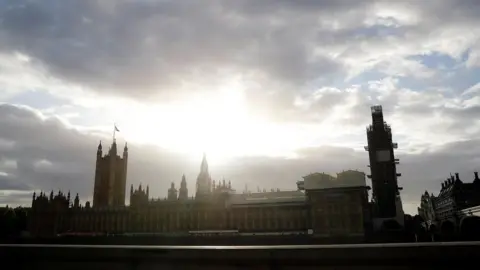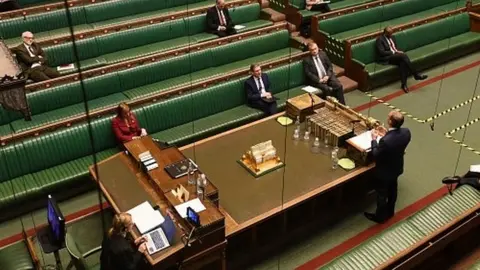New penalties proposed for rule-breaking MPs
 AFP
AFPMPs could be banned from foreign trips or made to take anger management classes under a proposed revamp of Parliament's sanctions regime.
The Commons Committee on Standards said a wider range of penalties was required for MPs found to have broken the official code of conduct.
Breaches can include misuse of office expenses and incorrectly registering financial interests.
MPs are typically asked to apologise, but can be suspended in extreme cases.
The committee's power to investigate MPs for bullying or harassment is set to be handed over to a new independent panel recently approved by MPs.
The decision to set up the panel, to be made up of eight members, follows a 2018 inquiry led by Dame Laura Cox into how allegations are handled.
Under the current sanctions system, set up in 1995 in the wake of the "cash for questions" scandal, the committee can order MPs to apologise or pay back money if they are found in breach of the code.
In serious cases, it can also ask for MPs to be suspended without pay or expelled from Parliament - although this requires approval from the Commons as a whole.
Under the current regime, the committee has never recommended expulsion, and has only recommended suspension on 15 occasions.
Since 2015, MPs suspended for longer than two weeks have also been subject to a recall process which can result in them being forced to re-stand as an MP.
Behaviour agreements
In a report, the committee said an "expanded suite of sanctions" was required to more appropriately deal with MPs who fall foul of the rules.
Labour MP Chris Bryant, who chairs the committee, said: "For too long the only sanctions available against MPs have been a slap on the wrist or suspension from the House."
He added that an expanded range of sanctions would give MPs "a clear idea of the kind of attitudes and conduct we are trying to promote and those we wish to eliminate".
 Reuters
ReutersUnder their proposals, Parliament's Standards Commissioner Kathryn Stone would get the power to force MPs to attend diversity training - or sign up to "behaviour agreements".
She would also be able to ban MPs from official overseas trips or withdraw their membership of a select committee for up to five years.
MPs could also be banned from accessing parliamentary services such as bars and the Commons library - although MPs would have to decide the details.
The committee has also recommended that the new independent panel investigating bullying allegations should get a similar range of powers.
The committee said it had made its recommendations to help the new panel to quickly decide its own sanctions framework.
Both the proposed changes to the sanctions for breaking the code, and the new powers for the panel, will need to be signed off by the Commons as a whole.
'Genuine remorse'
In an effort to make penalties fairer, the committee has also published a list of aggravating and mitigating factors to be taken into account.
Under the committee's proposed system, a harder line could be taken with longer-serving MPs compared to their less experienced colleagues.
On the other hand, MPs could escape harsher sanctions if they can show they are suffering from mental health problems, or show "genuine remorse".
These factors would, however, not apply in cases to do with bullying or harassment.
Recent sanctions
MPs who have fallen foul of the code in recent years include Boris Johnson, who in April 2019 was found to have not declared a financial interest in a timely manner.
He was ordered to apologise in the chamber and told to attend a briefing from officials on the rules.
The most recent example of an MP suspended from Parliament came earlier this year, when Conservative MP Conor Burns was found to have used his position as an MP to intimidate a member of the public.
Mr Burns said he accepted the sanction "unreservedly" and also resigned as a trade minister.
